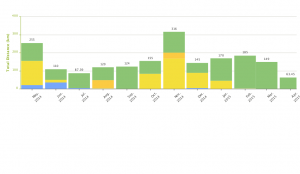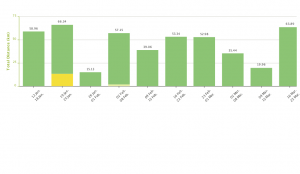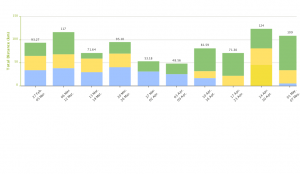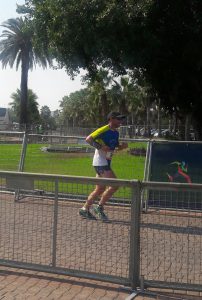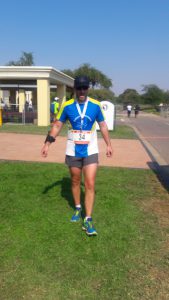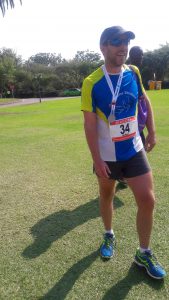Last week I ran my second Diacore Gaborone Marathon, two years after the first. I was worried that I hadn’t done enough long runs during training to perform well, compared to how I remembered training before my first attempt, but I managed to knock 9 minutes off.
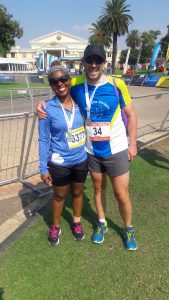
So, for the benefit of anybody who is thinking about running further and outside their comfort zone here are a few notes on my preparation and anecdotal evidence on how to survive.
The Preparation
When I look back in my training records for the two months before the event in March 2015 I can see that in December I ran 56km, January 125km, and 192km in February. Most of these runs were <10km interval/fartlek sessions as guided by a Garmin 16 week training plan (I only used the last 8 weeks because I was already comfortable at the 21km distance. Weekends had me doing longer runs up to about 30km. There is a conspicuous absence of cycling and rowing as well.
This year I didn’t do anything longer than 21km in the last two months before the event, only a 30km hill session in Kopong at the beginning of the year and 2 x 21km back-to-back on a weekend in March, hence my concern that my legs weren’t going to hold out for 42.2km. What I have been busy with are rowing (a fairly vicious 14 week program that finished a month before), cycling to work (7km/day…) and core training.
Running distances in the months before the race were 159km in January, 146 in February and 104 in March, but a bit longer than the 2015 sessions with regular club runs of Tuesday 12km, Thursday 14km and Saturday 21km. Some of which were intervals, or just outright vrrphaa sessions with faster bus drivers.
In 2015 I “hit the wall” at about 35km with empty batteries, the main reason for this was the crap catering at marathons in these parts: water sachets and cups of cola (if you are lucky), so I wasn’t able to keep myself fuelled up. As the linked article explains, you have a certain amount of energy tucked away as glycogen and I know that I can knock out about 21km without food or water. So this year I resolved to make sure I kept on top of the energy curve, my calculations suggested I would need about 10 bananas and 10 cups of cola (about 100kcal each, and using about 100kcal per km).
This was easier said than done, catering was crap again. I survived by grabbing a large handful of marshmallows at 7km, maybe 10 cups of cola, and 2 bananas on the second lap “distance adjustment” section in Madirelo/G West Industrial. I might have been a bit foolish in skipping the offer of Striders‘ “bandit catering” on the back straight past UB but felt fine at the time. Anyway, I lasted up to about 36km before feeling the wall, but managed to push through with only a short walk in CBD and made it home 30 seconds inside my target time of 4hr:30min thanks to a fellow runner pacing me the last few km.
The Event
As mentioned above, race organisers in Botswana really don’t understand distance running, from what I heard the 10km event had more and better stocked water points than us, and even as I was coming round on the second circuit some of the 21km water points were packing up already.
The route was generally well marked with cones, plenty of marshals, and police at main junctions being kind enough to give us priority. However, driving standards are pretty low and I witnessed so many instances of cars, taxis and combis cutting in and out of the cones. No sign of the police making any attempt to charge drivers with careless or dangerous driving though. I heard later about two runners being knocked over at different locations and one runner robbed of his smartphone.
The event cost P500 to enter (including “Pro Pack” of t-shirt and timing chip). The event goodie bag comprised a water bottle, mini Lunch Bar, energy drink and roll of sugar tablets. I’d love to know how much of that gets returned to charity by Diacore after paying for the event setup (timing, barriers, entertainment, security, etc.). I guess it’s one of those things where we have a relatively small population to support such events, so economies of scale are not there (1,551 for 10km, 384 for 21.1km and 118 for 42.2km), and if we don’t participate then there won’t be any events.
